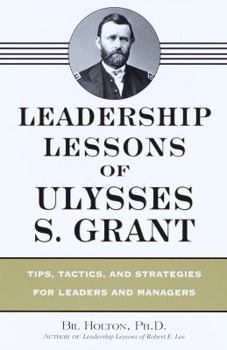Leadership Lessons of Ulysses S. Grant
Select Format
Select Condition 
Book Overview
No Synopsis Available.
Format:Hardcover
Language:English
ISBN:051716180X
ISBN13:9780517161807
Release Date:August 2000
Publisher:Gramercy Books
Length:176 Pages
Weight:0.70 lbs.
Dimensions:0.7" x 5.8" x 8.5"
Customer Reviews
3 ratings
Simple Easy Lessons for Leaders and Managers
Published by Thriftbooks.com User , 22 years ago
Try 147 pages of easy to read and understand logic to improve your leadership skills. This should be part of an advertisement for this little gem.It's a small book, with more white space on the page then words, but the power and effect of the words included are tremendous. No fancy, long, complicated wrtiing, but just right to the point writing that will make it's impact. If it takes 4 hours to read the whole thing, you're a slow reader. But it's the lessons, the lessons that will be around you for a long time. And it's all so simple. That is the truly amazing aspect of the book, simplicity.Dr. Holton, in discussing General Grant's leadership qualities, in fact uses them in his writing. Every character that he discusses is reflected in the writing style of the book. The section on "Brevity", well it's the shortest of the book. See what I mean? Dr. Holton also shows the greatness of Grant through the eyes of others using their own words to describe the man who was the General.This is a very, very good book for learning and studying. I didn't enjoy it as some other reads that I've made recently, but I have not a single regret. The time went fast, and the book succeeded in it's goal, to teach me about the great man that was General Grant, and also about the tools he used, that I can use, to lead people.Thank you Dr. Holton. R. E. Lee is next.....
The Manager of the Civil War
Published by Thriftbooks.com User , 23 years ago
Once upon a time, books of this nature were written by people such as Benjamin Franklin and called "Poor Richard's Almanac." "Eat to live, and not live to eat," Franklin advised in 1732, without crediting his wisdom to Socrates or Moliere. The result was a very practical book, for people who consider themselves to be very practical Americans. This book is similar, except for its somewhat narrower emphasis on leadership rather than the all-encompassing appeal of Franklin. Holton, Ph.D., does something better than Franklin -- his method of instruction is by citing examples and then offering an explanation. "I never learned to swear . . . I could never see the use of swearing . . . I have always noticed . . . that swearing helps to rouse a man's anger," is one such observation, from `Campaigning With General Grant.' Bil (sic) Holton, Ph.D., explains, "Profanity is nothing more than a vulgar descendant of Neanderthal grunts" and goes on to point out that "Leaders who use it are suffering from delusions of its relevance." It's a book of common sense. Grant was not a man who would ride past marching troops, splashing them with mud and water; he was not a man who demanded better food, instead he often ate the same food as his men; and to have a well-disciplined command, he did not consider it necessary to have an unhappy army. Compare that to modern executives who think an imperial limousine, an executive dining room and the fear of employees are necessary elements of modern management. The book is successful on two levels; first, it explains why Grant was the most successful general in American history, and secondly it explains how his methods can be applied to modern business and everyday life. For example, Grant once asserted, "It is men who wait to be selected, and not those who seek, from whom we may expect the most efficient service." Holton, Ph.D., points out "Those who covet the next promotional opportunity usually miss relevant -- and defining -- work experience. Fast-trackers eventually suffer from competence anorexia . . ." Time and again we see this fault in modern corporations, the Business School graduate promoted into middle or upper management without having a clue about the product or employees who make the product. Likewise, the employee who is always a toady to the boss without ever caring about fellow employees is an eventual loser. This is a book about common sense. Grant was superb at it, which is why he so out-classed Robert E. Lee when it came to winning a war instead of fighting clever battles. It's not manpower or supplies that make a conquering army, it's leaders such as Grant for whom the soldiers are ready to die. There are two types of armies -- those who fight, and those who run. Grant's army knew it would never have to run. Grant was a winner, primarily because his soldiers respected him. It's a good lesson for modern executives. After all, if his attitude was more widespread among modern mana
Excellent
Published by Thriftbooks.com User , 23 years ago
I did write a review for this, and you people deleted it! Please email me to explain why?





